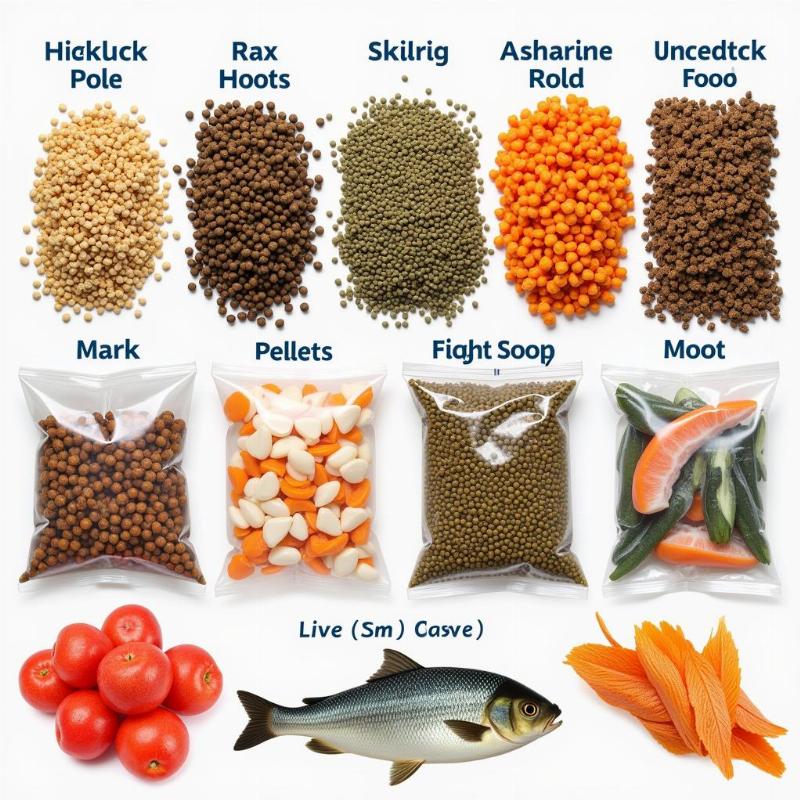Dog food and fish food are formulated for very different dietary needs. While the thought of sharing your pup’s kibble with your finned friend might seem harmless, it’s important to understand why feeding fish dog food is not recommended. This article will delve into the specific nutritional requirements of dogs and fish, explaining why dog food isn’t a suitable substitute for a fish’s regular diet.
Why Dog Food Isn’t Suitable for Fish
Dogs and fish have vastly different digestive systems and nutritional requirements. Dogs are omnivores, meaning they can digest both plant and animal matter. Their food contains a balance of proteins, fats, carbohydrates, vitamins, and minerals tailored to their specific needs. Fish, on the other hand, have much more specialized diets, ranging from herbivores to carnivores, and their nutritional needs vary greatly depending on the species. Dog food simply doesn’t offer the correct balance of nutrients for a fish’s health and could even be harmful.
The Dangers of Feeding Fish Dog Food
Feeding dog food to fish can lead to a number of health problems. The high protein content in dog food can overload a fish’s digestive system, leading to digestive issues, constipation, and even organ damage. Furthermore, dog food lacks essential fatty acids like omega-3s, which are crucial for the health of many fish species, especially for maintaining their immune systems and promoting healthy skin and scales.
The incorrect balance of vitamins and minerals in dog food can also be detrimental to a fish’s health. For example, too much vitamin A, often found in dog food, can be toxic to fish. Moreover, uneaten dog food can quickly foul the water in a fish tank, leading to a build-up of ammonia and nitrates, which are toxic to fish. A clean aquatic environment is essential for fish health, and feeding them an inappropriate food like dog food can severely compromise water quality.
What to Feed Your Fish Instead
Choosing the right food for your fish is crucial for its well-being. The best option is always a high-quality fish food specifically formulated for your fish’s species. These foods come in various forms like flakes, pellets, and tablets, and are designed to meet the unique dietary needs of different types of fish. Always consult a pet store professional or a knowledgeable aquarist to determine the best food for your specific fish.
 Types of Fish Food
Types of Fish Food
Conclusion: Stick to Fish Food for Fish
In short, the answer to the question “Can you feed fish dog food?” is a resounding no. While it might seem convenient to share your dog’s food with your fish, it’s simply not appropriate for their dietary needs and can even be harmful. Always choose a high-quality fish food formulated for your fish’s species to ensure they receive the proper nutrition for a long and healthy life. Remember, a healthy fish is a happy fish!
FAQ
-
What should I do if I accidentally fed my fish dog food? Remove any uneaten dog food from the tank immediately and perform a partial water change to improve water quality. Monitor your fish for any signs of illness.
-
Can I give my fish other human food? Some human foods, like small amounts of blanched vegetables, can be offered as occasional treats, but always research what is safe for your specific fish species.
-
How often should I feed my fish? This depends on the species. Some fish need to be fed several times a day, while others can go for longer periods. Research your fish’s specific needs.
-
How do I know if my fish is getting the right nutrition? A healthy fish will have vibrant colors, clear eyes, and active behavior. If you notice any changes in your fish’s appearance or behavior, consult a veterinarian or aquarist.
-
Where can I find high-quality fish food? Reputable pet stores and online retailers specializing in aquatic life are good places to find appropriate fish food.
-
Can I mix different types of fish food? Yes, you can mix different types of fish food, such as flakes and pellets, to provide a varied diet, but ensure all are suitable for your fish species.
-
What if my fish refuses to eat its food? This could indicate a problem. Check the water quality, ensure the food is fresh, and consult a veterinarian or aquarist if the issue persists.
Beautdogs.us is your premier online resource for comprehensive dog care information. We provide expert guidance on dog breeds, nutrition, health, and lifestyle, empowering dog owners to make informed decisions. Whether you’re a new pet parent or a seasoned dog lover, Beautdogs.us offers trusted advice and resources to help you navigate every aspect of dog ownership. Contact us at [email protected] or +1 501-555-7529 for expert advice and guidance tailored to your needs.